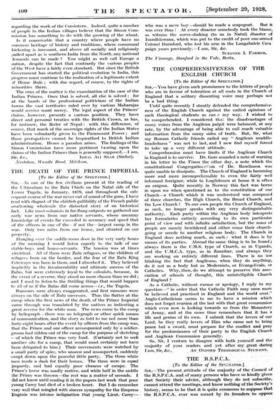THE COMPREHENSIVENESS OF THE ENGLISH CHURCH
[To the Editor of the SPECTATOR.] SIR,—You have given such prominence to the letters of people who are in favour of toleration at all costs in the Church of England that a solitary dissenting voice may perhaps not be a bad thing.
Until quite recently I stoutly defended the comprehensive- ness of the English Church against the united opinions of such theological students as can.e my way. I wished to be comprehended. I considered that the disadvantages of many voices from the Anglican pulpit were balanced, at any rate, by the advantage of being able to cull much valuable information from the many sides of truth. But, Sir, what my Roman Catholic friends called my. " Anglican muddle- headedness " was not to last, and I now find myself forced to take up a very different attitude.
Comprehension must have limits if the Anglican Church
in England is to survive. Dr. Gore sounded a note of warning in his letter to the Times the other day, a note which the constitutional Congregatioee.rsm of Dr. Rawlinson was quite unable to dissipate. The Church of England is becoming more and more incomprehensible to even the fairly well informed foreigner, while to Lnglishmen at home it is often an enigma. Quite recently, in Norway this fact was borne in upon me when questioned as to the constitution of our Church—a Church which it was understood was composed of three churches, the High Church, the Broad Church, and the Low Church ! To our own people the Church of England, as such, no longer speaks with any very distinguishable authority. Each party within the Anglican body interprets her formularies entirely according to its own particular point of view and with infinite satisfaction, but the mass of people are merely bewildered and either cease their church- going or secede to another religious body. The Church in England does nothing much, as such : what it does is by means of its parties. Abroad the same thing is to be found ; always there is the C.M.S. type of Church, as in Uganda, and the U.M.C.A. type, as in Zanzibar, and always they are working on entirely different lines. There is no use blinking the fact that Anglicans, when they do anything, do it not as a body but as Modernists, or Evangelicals, or Catholics. Why, then, do we attempt to preserve this asso- ciation of schools of thought, this unintelligible Church of England ?
As a Catholic, without excuse or apology, I reply to my question—" in order that the Catholic Faith may once more be believed and practised in England and the world over." Anglo-Catholicism seems to me to have a mission which does not forget reunion at the last with that great communion which even now is looking towards us from the Monastery of Arnay, and at the same time remembers that it has a life and genius of its own. I submit that the lovers of out Lord, be they really lovers of Him who came not to bring peace but a sword, must prepare for the conflict and pray for the predominance of their party in the English Church and Anglican Communion generally.
So, Sir, I venture to disagree with both yourself and the majority of your readers and yet after my great daring
I am, Sir, &c., AN OXFORD THEOLOGICAL STUDENT.




































 Previous page
Previous page